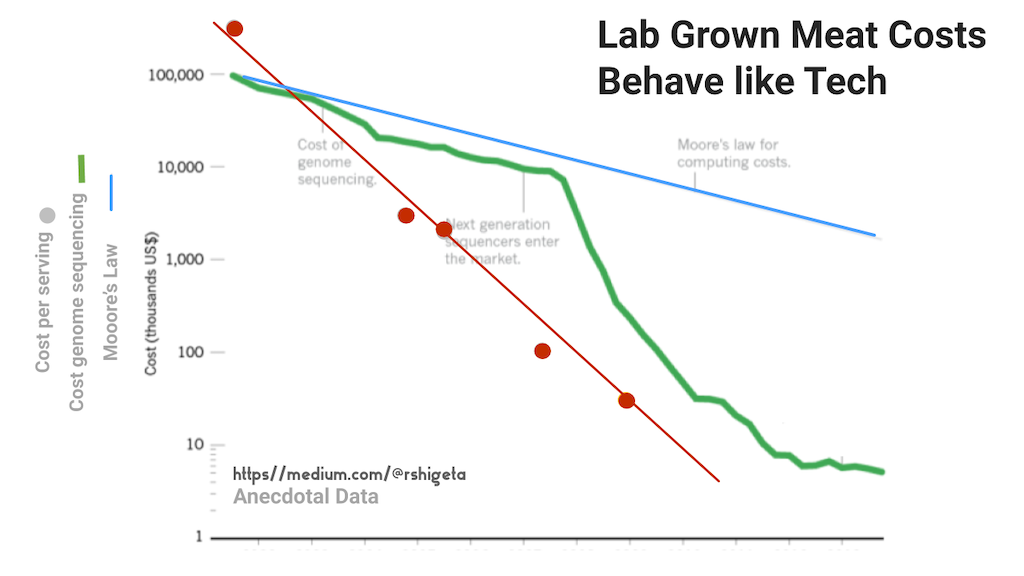3 Mins Read
Lab-grown meat is scaling like the internet, in the words of Ron Shigeta. He’s the co-founder of science accelerator IndieBio, former chief scientific officer of plant-based pet food brand Wild Earth, current resident scientist of early-stage startup venture capital Babel Ventures and consultant for Clara Foods, the fermentation company creating eggs without chickens – just to name a few. Shigeta’s bet is that lab-grown meat will be around much faster than we think, to the chagrin of Impossible Foods founder and CEO Patrick Brown, who thinks the cell-based meat scene will never quite make it.
“It’s easy to think that there’s hype in lab-grown meat. Just another Silicon Valley utopian tech,” Shigeta writes in an article. “[But] a look at the forces driving cellular agriculture and we will see that lab-grown meat will be a part of everyday life in a surprisingly short time.”
Recording lab-grown meat statements and estimates of costs since 2013 into a pricing plot, Shigeta says that the scaling up of lab-grown meat and its corresponding decrease in cost is steeper than Moore’s Law – the golden rule for the internet age dictating that the speed and capability of digital tech would increase every few years while it becomes cheaper for consumers.
A look at the forces driving cellular agriculture and we will see that lab-grown meat will be a part of everyday life in a surprisingly short time.
Ron Shigeta

“The first human genome sequence was perhaps US$300 million. Last year, I bought a holiday special to buy my own 20x covered genome sequence for $800,” Shigeta writes. “Although not a consumer product by and large, sequencing is so cheap as to be just under the surface of our daily lives.”
“This curve is why Memphis Meats was an easy investment for me four years ago and why investors often jump in since. 65 years of cell culture research by a few million researchers worldwide as well as a global network of manufacturing experience all ready to jump in.”
Memphis Meats, the Berkeley, California-based cultivated meat startup, secured a record-breaking US$161 million Series B round earlier this year in January. The funding round, backed by SoftBank and Temasek, shattered the cell-based ceiling, topping all of the publicly disclosed funding into the cultivated meat industry combined and essentially doubled the current sector’s total investment to date.
Yes, there is hype — the same sort of hype that the automobile created. Small companies claiming too much and flaming out. But make no mistake, animal-free, lab-grown, cultured meat is coming sooner than you think.
Ron Shigeta

Shigeta added that in addition to a steeper line, the wave of product release announcements released this year alone is indicative of the fast scale-up the industry is undergoing. Mission Barns, for instance, recently launched a taste test of its cell-based bacon around San Francisco Bay Area restaurants, while Memphis Meats is using its cash injection to build a pilot production site ahead of a product roll-out.
Singapore’s Shiok Meats, upon completing their US$12.6 million Series A round, says they will use the money to construct its first commercial pilot facility, where the startup will launch its sustainable, traceable cultivated minced shrimp product in 2022. It will put the food tech on track to become the world’s first to launch a fully-functional commercial pilot plant dedicated to cell-based crustacean production.
“At the current rate of innovation the next future of meat could be here in the next few years,” states Shigeta. “Yes, there is hype — the same sort of hype that the automobile created. Small companies claiming too much and flaming out. But make no mistake, animal-free, lab-grown, cultured meat is coming sooner than you think.”
Lead image courtesy of Memphis Meats.




